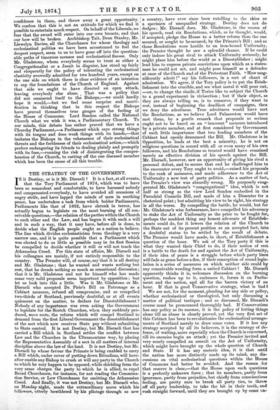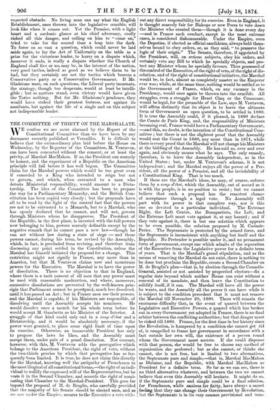THE STRATEGY OF THE GOVERNMENT.
IS it Destiny, or is it Mr. Disraeli ? It is a fact, at all events, that the Tory Parliament of 1874, which was to have been BO somnolent and comfortable, to have harassed nobody and compensated everybody, to have avoided all occasions of angry strife, and have lapped the minds of men in soothing peace, has undertaken a task from which bolder Parliaments, Parliaments like that of 1832, have shrunk in terror, has actually begun to legislate on the most burning of all con- ceivable questions,—the relation of the parties within the Church to each other and the Law, and has begun it with such a will and in such a way, that it may have, before all is done, to decide what the English people ought as a nation to believe. The line which divides ecclesiasticism from theology is a very narrow one, and it is quite possible that a Parliament which was elected to do as little as possible may in its first Session be compelled to decide whether it will or will not teach the Athanasian Creed. For this state of affairs, Mr. Disraeli and his colleagues are mainly, if not entirely responsible to the country. The Premier will, of course, say that it is all destiny and Mr. Gladstone ; that he wanted and wants nothing but rest, that he dreads nothing so much as sensational discussion ; that it is Mr. Gladstone and not he himself who has made some very mild proposals seem important by opposition ; but let us look into this a little. Was it Mr. Gladstone or Mr. Disraeli who accepted Dr. Pine's Bill on Patronage as a Cabinet measure, refused all compromise, and so compelled two-thirds of Scotland, previously doubtful, or at all events quiescent on the matter, to declare for Disestablishment ? Nobody of any importance was even asking the Government to legislate for the Scotch Churches, when they suddenly pro- duced, mero motu, the reform which will compel Scotland to demand from the first Liberal Government the disestablishment of the sect which now receives State pay without submitting to State control. It is not Destiny, but Mr. Disraeli that has carried a Bill which in Scotland settles the conflict between Law and the Churches in the Ultramontane way, by placing the Representative Assembly of a sect in all matters of internal discipline above the law of the land. It is not Destiny, but Mr. Disraeli by whose favour the Primate is being enabled to carry a. Bill which, under cover of putting down Ritualism, will here- after enable any Bishop to crush at will any party in the Church to which he may happen to be opposed, while shielding from the very same charges the party to which he is allied, to expel Broad Churchmen, for instance, for not feading the Commina- tion Service, or Low Churchmen for omitting the Athanasian Creed. And finally, it was not Destiny, but Mr. Disraeli who, on Monday night, made the extraordinary move which his followers, utterly bewildered by his pilotage through so new a country, have ever since been extolling to the skies as a specimen of unequalled strategy. Destiny does not do , dodges ; Mr. Disraeli does. Mr. Gladstone, in the course of I his speech, peech read six Resolutions, which, as he thought, would, I if accepted, pledge the House to a better reform than the one secured or sought to be secured, by the Primate's Bill ; and as those Resolutions were hostile to an iron-bound Uniformity, the Premier thought he saw a splendid chance. If he could only induce his great rival to attack Uniformity seriously, he might place him before the world as a Disestablisher ; might lead him to express private convictions upon which as a states- man he could not act, and might pose himself as a defender at once of the Church and of -the Protestant Faith. "How mag- nificently adroit !" say his followers, in a sort of chant of admiration. We agree, if the Tory policy is to put the Estab- lishment into the crucible, and see what metal it will pour out, —or, to change the simile, if Tories like to subject the Church to a grand experiment in vivisection ; but if their object, as they are always telling us, is to conserve, if they want to rest, instead of beginning the deadliest of campaigns, then we deny the adroitness. True adroitness would have met the Resolutions, as we believe Lord Palmerston would have met them, by a gentle remark that proposals so serious ought not to be based on an " innocent " measure introduced by a private member, and at first considered by Government of such little importance that two leading members of the Cabinet had openly denounced the Bill. Mr. Gladstone is in Opposition, he leads at the best a minority, he is not on religious questions in accord with all or even many of his °tan followers, and his Resolutions so treated would have remained merely an effective division of his speech against the Bill. Mr. Disraeli, however, saw an opportunity of giving his rival a personal defeat, and to secure that end he challenged him to the encounter every Tory ought to avoid,—raised his proposals to the rank of measures, and made adherence to the Act of Uniformity a new test of party politics. As a matter of fact, the Premier's view was absurdly wrong. He purposely exag- gerated Mr. Gladstone's " congregational " idea, which is not half so strong as the view Lord Sandon embodied in the Parochial Councils Bill, and made of him a Dissenter for a rhetorical point ; but admitting his view to be right, his strategy is all the worse. By compelling the battle, he would, but for Mr. Gladstone's wise forbearance, have compelled his adversary to stake the Act of Uniformity as the prize to be fought for, perhaps the maddest thing any honest advocate of Establish- ments could do, for it lowers the relation of the Church to the State out of its present position as an accepted fact, into. a doubtful status to be settled by the result of debate. The Premier would have made, in short, of Establishment a question of the hour. We ask of the Tory party if this is what they wanted their Chief to do, if their notion of rest is a battle to the death for and against the Act of Uniformity, if their idea of peace is a struggle before which party lines will fade as grass before a fire, if their conception of sound legis-, lation is a series of measures on which neither side could by any conceivable weeding form a united Cabinet ? Mr. Disraeli apparently thinks it is, welcomes discussion on the burning question, rushes up to it, embraces it, forces it on Parlia- ment and the nation, and all for the barren victory of an hour. If that is good tonservative strategy, what is bad We are not, for the moment, pleading for any side or policy, whether ecclesiastical or theological, but only discussing a matter of political tactique ; and so discussed, Mr. Disraeli's course must be pronounced thoroughly bad. If Conservatism has any policy as its essence, it is the policy of letting things alone till an abuse is clearly proved, yet the very first act of this Cabinet has been to revolutionise the ecclesiastical arrange- ments of Scotland merely to draw some votes. If it has any strategy accepted by all its believers, it is the strategy of de- fence, of waiting, more especially when the Church is concerned, till its enemies begin an attack ; yet the Premier invited and very nearly compelled an assault on the Act of Uniformity, which might have brought up the whole question of Church and State. If it has any esoteric idea, it is that until the nation has more distinctly made up its mind, any dis- cussions on vital ecclesiastical questions within the House of Commons had better be avoided. And the reason for that reserve is clear,—that the House upon such questions is a perfectly unknown force ; that its members, partly from ignorance, partly from prejudice, but chiefly from conscientious feeling, are pretty sure to break all party ties, to throw off all party leadership, to take the bit in their teeth, and rush straight forward, until they are brought up by some un-
expected °Wade. No living man can say what the English Establishment, once thrown into the legislative crucible will look like when it comes out. Yet the Premier, with a light heart and a sardonic glance at his chief adversary, coolly
aked all this danger, and rattling on him to "come on," tried to take for the second time a leap into the dark. To force on so vast a question which could never be laid aside again, to lay the Act of Uliformity on the table as a prize for the victorious ],eader, to hurry on a dispute which, however it ends, is really a dispate whether the Church of Fargland shall live or no, may be, in the interest of the nation, very good tactics, ndeed as good as we believe them to be bad., but they certainly are not, the tactics which beseem a -Conservative party or a Conservative Government. If Mx. Gladstone were„ on such questions, the Liberal party incarnate, the strategy, though too desperate, would at least be intelli- gible; but as matters stand, even victory would have given the Tories nothing. But for Mr. Gladstone's prudence, they would have staked their greatest fortress, not against its assailants, but against the life of a single and on this subject uot indispensable leader.



































 Previous page
Previous page